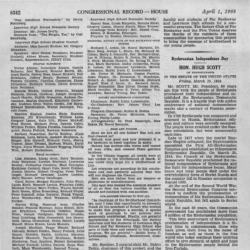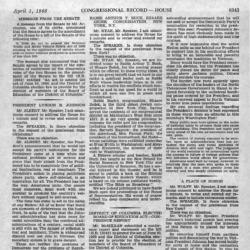Sponsor: Rep. William Ryan (D-NY)
Date of Prayer: 1 April 1968
Mr. RYAN. Mr. Speaker, we are indebted today to Rabbi Arthur T. Buch, of Shaare Zedek, for the moving prayer which he offered. In these trying times, it is to our great benefit that we have in our midst a spiritual leader such as Rabbi Buch whose leadership helps us in our efforts to resolve the conflicts which confront us and in our quest for a world in which all men can live in peace and brotherhood.
Rabbi Buch’s congregation, Shaare Zedek, is the third oldest Jewish congregation in New York City, having served the residents of my congressional district on Manhattan’s West Side since 1837. It is my very special privilege to welcome the rabbi and his congregation, including the president of the congregation, Barnett Kaprow; the president of the sisterhood, Mrs. Fannie Platt; the president of the brotherhood, Sol Nodel—whose paintings were exhibited yesterday at B’nai B’rith in Washington; and Alexander Elishewitz, the director of their visit to Washington.
A Hebrew scholar and teacher, Rabbi Buch has taught at the New School for Social Research in New York City and the University of Scranton. He has a special interest in the theater, and he is about to publish a book on the Biblical influence in our modern theater, which is based on his column published weekly, entitled “The Bible on Broadway.”
We are indeed privileged to have Rabbi Buch open the proceedings of the House of Representatives. His words of prayer reflect his deep compassion and understanding.
| Contribute a translation | Source (English) |
|---|---|
Our fathers’ God who hast endowed all humanity with unalienable rights of life, liberty, and the pursuit of happiness,[1] Cf. the US Declaration of Independence, stylized by Benjamin Franklin and penned by Thomas Jefferson, famously signed 4 July 1776. Scholars differ as to whether the historical origin of “life, liberty, and the pursuit of happiness” are rooted in Lockean Rights (following after the “Virginia Declaration of Rights” written by George Mason and adopted 12 June 1776) or possibly in Jefferson’s self-proclaimed Epicureanism. –Aharon Varady. with whom the people of America have entered into a compact to guarantee that endowment, we acknowledge the blessedness which has come to our Nation— its land and its people. | |
At this hour when some of the blessing is in danger of being blighted, we ask Thy grace upon the leader of our Republic, the President of the United States, the constituted officers of its realm, and the representatives of the people. Guide them in their decisions, and strengthen them in their determination to convert the agony of Vietnam into a triumph of the spirit. | |
Remove the strange symbols of hawks and doves from our midst, and restore the American eagle in its majestic soaring heavenward as our chief concern and pride. Amen. |
This prayer of the guest chaplain was offered in the third month of the second session of the 90th US Congress in the House of Representatives, and published in the Congressional Record, vol. 114, part 7 (1968), page 8342.
Source(s)
Notes
| 1 | Cf. the US Declaration of Independence, stylized by Benjamin Franklin and penned by Thomas Jefferson, famously signed 4 July 1776. Scholars differ as to whether the historical origin of “life, liberty, and the pursuit of happiness” are rooted in Lockean Rights (following after the “Virginia Declaration of Rights” written by George Mason and adopted 12 June 1776) or possibly in Jefferson’s self-proclaimed Epicureanism. –Aharon Varady. |
|---|

“Prayer of the Guest Chaplain of the U.S. House of Representatives: Rabbi Arthur T. Buch on 1 April 1968” is shared through the Open Siddur Project with a Creative Commons Public Domain Dedication 1.0 Universal license.






Leave a Reply